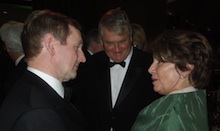
A decision by former 26-County Taoiseach Bertie Ahern, former European Commission Padraig Flynn and other party colleagues to resign from Fianna Fáil this week over the report of the Mahon tribunal is being seen as a potentially defining moment in the battle against corruption in Ireland.
The move to resign their membership came just days before the party’s National Executive met to consider a motion to expel them.
Ahern said he was “deeply saddened” by the tabling of a motion to expel him from the party which he led for 14 years. He continued to challenge the findings of the Mahon Tribunal into political corruption, whose damning findings against him and a number of other prominent political figures created upheaval for the 26-Count establishment last week.
The tribunal found that Ahern had been repeatedly “untruthful” in his explanations of a series of payments in multiple currencies throughout his tenure; and that Mr Flynn had pocketed at least one corrupt political donation, amounting to 50,000 Irish pounds. It also vindicated a characterisation of lobbyist Frank Dunlop as a political “bagman” for developers and politicians.
Fianna Fáil leader Micheál Martin had confirmed his intention to seek the expulsion of Mr Ahern, Mr Flynn and three others, apparently precipitating their resignations.
Amid public doubts that those involved will face any more serious punishment for their actions, Garda police commissioner Martin Callinan has claimed that an investigation arising out of the planning tribunal’s report would be headed by the Criminal Assets Bureau.
But many of the recommendations of the Mahon tribunal are identical with those issued by the Moriarty tribunal last year, which has already been shelved by the current government.
One of the assets which many come under investigation by the Gardai is Mr Ahern’s former constituency power base of St Luke’s in Drumcondra, Dubin. It was announced this week that it is to be handed over to Fianna Fail headquarters ahead of the investigation.
Micheal Martin has found himself under intense pressure over the extent his party benefited from corruption and his own participation in Mr Ahern’s former government. He has denied being aware of attempts by Fianna Fáil ministers to undermine or collapse the Mahon tribunal.
Although Fine Gael and Labour councillors were also found by Mahon to have been involved in the same type of corrupt local planning decisions that their Fianna Fail colleagues were implicated in, both parties strongly attacked Fianna Fail.
Tánaiste and Labour leader Eamon Gilmore said there was a connection between the corruption unearthed by the Mahon tribunal and the fact the economy had been brought to the edge of collapse.
“The property bubble was a product of the toxic triangle between Fianna Fáil, the banks and property developers,” he said. “There was a culture, at the highest levels of Irish society, that sought to make extraordinary fortunes on property development, and some politicians were determined to have their share.”
Taoiseach and Fine Gael leader Enda Kenny described the behaviour of Fianna Fáil ministers when criticising the inquiry in 2007 as “disgraceful” and promised his government would implement as many of the report’s recommendations as possible.
But Kenny’s relationship with infamous business tycoon Denis O’Brien, who was involved in a previous corruption scandal with former Fine Gael TD (now independent TD) Michael Lowry is being questioned this week.
The Taoiseach appeared alongside O’Brien at the opening bell of the New York Stock Exchange last Monday. The pair were also photographed last week speaking privately to US political figures at a banquet paid for by the ‘American Ireland Fund’. Mr O’Brien also attended the ‘Global Irish Economic Forum’ at the government’s invitation last year.
Sinn Fein leader Gerry Adams said institutionalised sleaze and corruption had become rife in the 26-County State.
“It was not just political life that was corrupt,” he said. “So, too, was the business elite.” Together, said Mr Adams, they formed golden circles of self-interest dedicated to preserving their wealth, privilege and power.
He said the corruption had not begun 20 years ago with other tribunals. Institutional corruption and ‘gombeenism’ were part and parcel of British colonial rule on the island and the practices survived and thrived in the post-colonial period.
Republican Liam Mellows, he said, had warned of that development in the treaty debates, when he predicted that men would get into positions of power and desire to remain there.
Mr Adams said power had been abused on the basis of self-interest and not in the interests of citizens.
éirígí chair, Brian Leeson, called for the “jailing” of politicians, developers and lobbyists who were involved in the corruption of the planning system.
He said hundreds of thousands of people living in the suburbs of Lucan, Clondalkin, Carrickmines and elsewhere “didn’t need a 3,000 page report to tell them that there was something wrong with the planning system.
“They have been living with the consequences of the politicians’ and developers’ greed for years and they continue to live with them to this day,” he said.
All of those who took part in the corruption of the planning process were guilty of a form of treason, “betraying their fellow citizens in return for cash-filled brown envelopes.
“For that they should all serve lengthy jail terms, but they won’t.”
Leeson said “crocodile tears” by Enda Kenny, Micheal Martin and Eamon Gilmore would not help bring about the necessary changes to the political system in Ireland.
“The people of the Twenty-Six Counties are slowly coming to realise that the old pillars of their state, in the form of the Catholic Church, the political class, the business class and the corporate media are not the pillars of virtue they proclaim themselves to be. The rot in this state goes from the very bottom to the very top of the establishment.”
![[Irish Republican News]](https://republican-news.org/graphics/title_gifs/rn.gif)
![[Irish Republican News]](https://republican-news.org/graphics/title_gifs/harp.gif)

